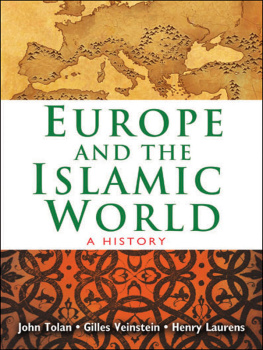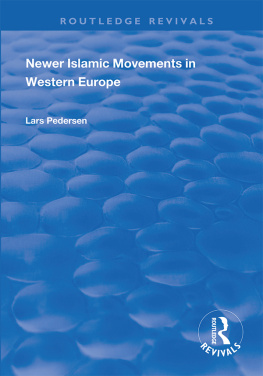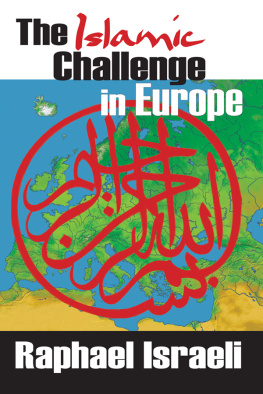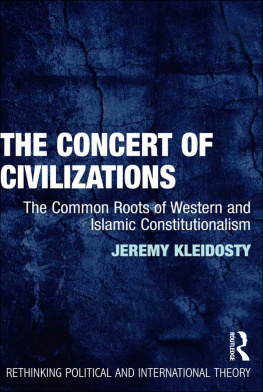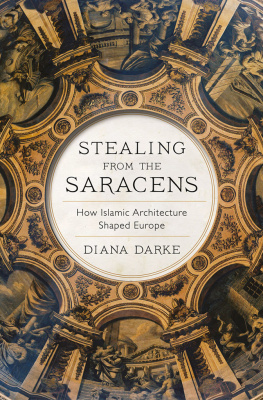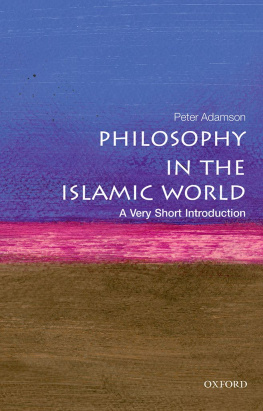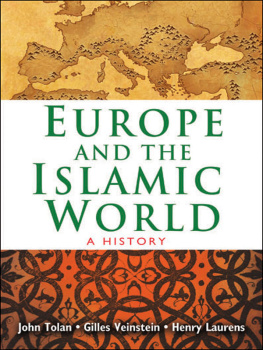Laurens Henry - Europe and the Islamic World: A History
Here you can read online Laurens Henry - Europe and the Islamic World: A History full text of the book (entire story) in english for free. Download pdf and epub, get meaning, cover and reviews about this ebook. City: Europe;Islamic countries;Middle East, year: 2017;2012, publisher: Princeton University Press, genre: Religion. Description of the work, (preface) as well as reviews are available. Best literature library LitArk.com created for fans of good reading and offers a wide selection of genres:
Romance novel
Science fiction
Adventure
Detective
Science
History
Home and family
Prose
Art
Politics
Computer
Non-fiction
Religion
Business
Children
Humor
Choose a favorite category and find really read worthwhile books. Enjoy immersion in the world of imagination, feel the emotions of the characters or learn something new for yourself, make an fascinating discovery.
- Book:Europe and the Islamic World: A History
- Author:
- Publisher:Princeton University Press
- Genre:
- Year:2017;2012
- City:Europe;Islamic countries;Middle East
- Rating:3 / 5
- Favourites:Add to favourites
- Your mark:
- 60
- 1
- 2
- 3
- 4
- 5
Europe and the Islamic World: A History: summary, description and annotation
We offer to read an annotation, description, summary or preface (depends on what the author of the book "Europe and the Islamic World: A History" wrote himself). If you haven't found the necessary information about the book — write in the comments, we will try to find it.
Europe and the Islamic World: A History — read online for free the complete book (whole text) full work
Below is the text of the book, divided by pages. System saving the place of the last page read, allows you to conveniently read the book "Europe and the Islamic World: A History" online for free, without having to search again every time where you left off. Put a bookmark, and you can go to the page where you finished reading at any time.
Font size:
Interval:
Bookmark:

EUROPE AND THE ISLAMIC WORLD
EUROPE AND THE ISLAMIC WORLD
A HISTORY
JOHN TOLAN, GILLES VEINSTEIN, AND HENRY LAURENS
Translated by Jane Marie Todd With a Foreword by John L. Esposito

Copyright 2013 by Princeton University Press
Published by Princeton University Press, 41 William Street, Princeton, New Jersey 08540
In the United Kingdom: Princeton University Press, 6 Oxford Street, Woodstock, Oxfordshire
OX20 1TW
press.princeton.edu
All Rights Reserved
Library of Congress Cataloging-in-Publication Data
Tolan, John Victor, 1959
[Europe et lislam. English]
Europe and the Islamic world : a history / John Tolan, Gilles Veinstein, and Henry Laurens ; translated by Jane Marie Todd With a Foreword by John L. Esposito.
p. cm.
Henry Laurenss name appears first on the original French ed.
Includes bibliographical references and index.
ISBN 978-0-691-14705-5 (hardcover : alk. paper) 1. EuropeRelationsMiddle East. 2. Middle EastRelationsEurope. 3. EuropeRelationsIslamic countries. 4. Islamic countriesRelationsEurope. 5. EuropeCivilizationIslamic influences. 6. Islamic civilizationWestern influences. I. Veinstein, Gilles. II. Laurens, Henry, 1954 III. Todd, Jane Marie, 1957 IV. Title.
DS63.2.E8L3813 2013
303.48'2401767dc23
2012016021
British Library Cataloging-in-Publication Data is available
Cet ouvrage publi dans le cadre du programme daide la publication bnficie du soutien du Ministre des Affaires Etrangres et du Service Culturel de lAmbassade de France reprsent aux Etats-Unis.
This work received support from the French Ministry of Foreign Affairs and the Cultural Services of the French Embassy in the United States through their publishing assistance program.
This book has been composed in Minion Pro
Printed on acid-free paper.
Printed in the United States of America
1 3 5 7 9 10 8 6 4 2
FOREWORD
by John L. Esposito
CONTEMPORARY POLITICS and the media have too often produced a narrative of conflicting paradigms that sees the world and the history of relations between the West and Islam in terms of a clash of civilizations, Orientalism versus Occidentalism, fourteen centuries of jihad versus Crusades and colonialism, Islamophobia and anti-Westernism. Lost in the cultural crossfire are the religious, historical, political, and cultural diversity rather than monolithic nature of the West and the Muslim world and positive interactions and exchanges and cross-fertilization.
Despite common historical and theological roots and beliefs, Muslim-Christian relations have often been overshadowed by political and economic as well as religious conflict as the armies and missionaries of Islam and of Christendom have been locked in a struggle for power and for souls: from the fall of the Byzantine (eastern Roman) Empire before Muslim armies in the seventh century to the Crusades during the eleventh and twelfth centuries; the expulsion of the Moors from Spain and the Inquisition; the Ottoman threat to overrun Europe; European (Christian) colonial expansion and domination from the eighteenth to early twentieth centuries; the political and cultural challenge of the superpowers in the new colonialism or American neocolonialism since the latter half of the twentieth century; the creation of the state of Israel by Western Christian countries and Palestinian exile; the competition of Christian and Muslim missionaries today from Africa to Southeast Asia; and the contemporary reassertion of Islam in Muslim politics around the world.
Theologically, the very similarities of Christianity and Islam put the two on an early collision course. Islam belongs to the Abrahamic family of great monotheistic faiths. Muslims, like Jews and Christians, view themselves as the children of Abraham, as proclaimed in each of their sacred scriptures: the Old and New Testaments and the Quran. Despite specific and significant differences, Judaism, Christianity, and Islam share a belief in one God, the creator, sustainer, and ruler of the universe who is beyond ordinary experience. And all believe in angels, Satan, prophets, revelation, moral responsibility and accountability, divine judgment, and reward or punishment. Yet while Jews and Christians claim descent from Abraham and his wife, Sarah, through their son Isaac, Muslims trace their religious roots back to Abraham (Ibrahim) through Ismail, his firstborn son by Hagar, Sarahs Egyptian servant.
Both religions had a universal message and mission. Both possessed a supersessionist theologythat is, each community believed that its covenant with God was the fulfillment of Gods earlier revelation to a previous community that had gone astray. While Christians had little problem with their supersessionist views toward Judaism, a similar claim by Muslims to have the final revelation was unacceptable and, more than that, a threat to the uniqueness and divinely mandated role of Christianity to be the only means to salvation.
Christendom experienced the early conquests and expansion of Islam not only as a theological but also as a political and civilizational challenge to its religious and political hegemony. Muslim rule quickly spread from the Byzantine and Persian empires to Syria, Iraq, and Egypt, and swept across North Africa and into Europe, where Muslims ruled Spain and the Mediterranean from Sicily to Anatolia.
For non-Muslim populations in Byzantium and Persia, who had been subjugated by foreign rulers, Islamic rule meant an exchange of rulers rather than a loss of independence. Many in Byzantium willingly exchanged Greco-Roman rule for that of new Arab masters, fellow Semites, with whom they had closer linguistic and cultural affinities and to whom they paid lower taxes. Upon declaration of their allegiance to the Islamic state and payment of a poll (head) tax, these protected (dhimmi) peoples could practice their faith and be governed by their religious leaders and law in matters of faith and private life.
Islam often proved more tolerant than imperial Christianity, providing greater religious freedom for Jews and indigenous Christians; most local Christian churches had been persecuted as schismatics and heretics by a foreign Christian orthodoxy. As Francis Peters has observed:
The conquests destroyed little: what they did suppress were imperial rivalries and sectarian bloodletting among the newly subjected population. The Muslims tolerated Christianity but they disestablished it; henceforth Christian life and liturgy, its endowments, politics, and theology, would be a private not a public affair. By an exquisite irony, Islam reduced the status of Christians to that which the Christians had earlier thrust upon the Jews, with one difference. The reduction in Christian status was merely judicial; it was unaccompanied by either systematic persecution or blood lust, and generally, though not everywhere and at all times, unmarred by vexatious behavior.
The rapid spread and development of imperial Islam produced a rich Islamic civilization that flourished from the ninth to the twelfth centuries. Urban cultural centers emerged in Cairo, Baghdad, Cordova, Palermo, and Nishapur. With significant assistance from Christian and Jewish subjects, Muslims collected the great books of science, medicine, and philosophy from the West and the East and translated them into Arabic from Greek, Latin, Persian, Coptic, Syriac, and Sanskrit. The age of translation was followed by a period of great creativity as a new generation of educated Muslim thinkers and scientists made their own contributions to learning in philosophy, medicine, chemistry, astronomy, algebra, optics, art, and architecture. Towering intellectual giants dominated this period: al-Farabi (d. 950), Ibn Sina (known as Avicenna, 9801037), Ibn Rushd (known as Averroes, d. 1198), al-Biruni (9731048), and al-Ghazali (d. 1111). The cultural traffic pattern was again reversed when Europeans, emerging from the Middle Ages, turned to Muslim centers of learning to regain their lost heritage and to learn from Muslim advances in philosophy, mathematics, medicine, and science. They retranslated the Greek philosophers and the writings of their great Muslim disciples: men like al-Farabi, who had come to be known as the second teacher or master (the first being Aristotle) and Ibn Rushd (Averroes), remembered as the great commentator on Aristotle. Many of the great medieval Christian philosophers and theologians (Albert the Great, Thomas Aquinas, Abelard, Roger Bacon, Duns Scotus) acknowledged their intellectual debt to their Muslim predecessors.
Next pageFont size:
Interval:
Bookmark:
Similar books «Europe and the Islamic World: A History»
Look at similar books to Europe and the Islamic World: A History. We have selected literature similar in name and meaning in the hope of providing readers with more options to find new, interesting, not yet read works.
Discussion, reviews of the book Europe and the Islamic World: A History and just readers' own opinions. Leave your comments, write what you think about the work, its meaning or the main characters. Specify what exactly you liked and what you didn't like, and why you think so.

